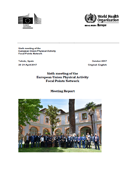Report of the Sixth meeting of the European Union Physical activity focal points network

Download
Toledo, Spain, 20–21 April 2017
In the context of the European Union Council Recommendation on Promoting Health-Enhancing Physical Activity (HEPA) Across Sectors adopted in 2013(hereafter referred to as ‘the Council Recommendation’), EU Member States have been requested to appoint national physical activity focal points notably to support the monitoring framework for HEPA policies and physical activity. As part of the collaboration to implement the above mentioned Recommendation in the EU and to promote physical activity across Europe, the European Commission, Directorate-General for Education and Culture (DG EAC), Sport Unit, and the WHO Regional Office for Europe, Division of Noncommunicable Diseases and Promoting Health through the Life-course, held the sixth meeting of this Focal Points Network on 20–21 April 2017 in Toledo, Spain.
The EU Physical Activity Guidelines, the Council Recommendation, as well as the WHO Physical Activity Recommendations and the Physical Activity Strategy for the WHO European Region 2016–2025 provide principles that require policy coherence across Europe. Some of these principles have been implemented with relative success in several Member States. However, challenges continue to exist, and there is a need to improve the design and implementation of policies that promote physical activity. Following the 2013 Council Recommendation on HEPA, the European Commission and the WHO Regional Office for Europe have been cooperating to develop and scale-up monitoring and surveillance of health-enhancing physical activity in the European Union Member States. Previous meetings of the EU Focal Points Network focused on the strategy for information collection and led to the publication of the Factsheets on health-enhancing physical activity in the 28 European Union Member States of the WHO European Region.
The sixth meeting, held at Castilla La Mancha University, Toledo, discussed a timeline for data collection and the validation of procedures for the update of the factsheets. Furthermore the meeting discussed recent advances at the national level, identified success stories and remaining challenges, with a particular focus on specific groups such as children, pregnant women or older people.



